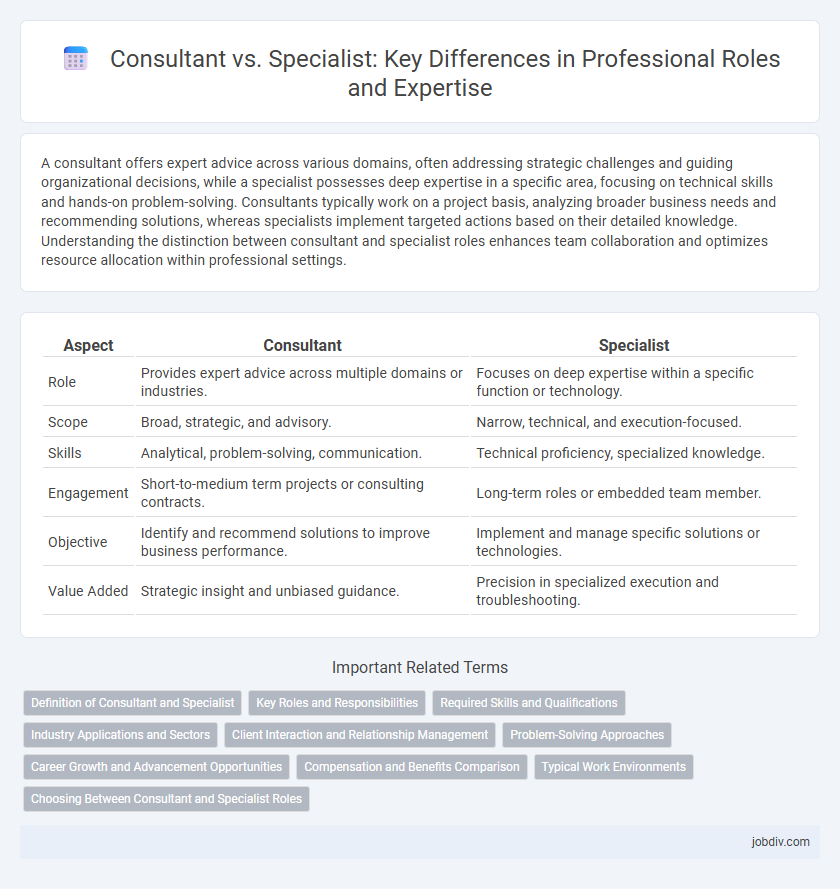A consultant offers expert advice across various domains, often addressing strategic challenges and guiding organizational decisions, while a specialist possesses deep expertise in a specific area, focusing on technical skills and hands-on problem-solving. Consultants typically work on a project basis, analyzing broader business needs and recommending solutions, whereas specialists implement targeted actions based on their detailed knowledge. Understanding the distinction between consultant and specialist roles enhances team collaboration and optimizes resource allocation within professional settings.
Table of Comparison
| Aspect | Consultant | Specialist |
|---|---|---|
| Role | Provides expert advice across multiple domains or industries. | Focuses on deep expertise within a specific function or technology. |
| Scope | Broad, strategic, and advisory. | Narrow, technical, and execution-focused. |
| Skills | Analytical, problem-solving, communication. | Technical proficiency, specialized knowledge. |
| Engagement | Short-to-medium term projects or consulting contracts. | Long-term roles or embedded team member. |
| Objective | Identify and recommend solutions to improve business performance. | Implement and manage specific solutions or technologies. |
| Value Added | Strategic insight and unbiased guidance. | Precision in specialized execution and troubleshooting. |
Definition of Consultant and Specialist
A consultant is a professional who provides expert advice and strategic guidance in a specific area to help organizations improve performance and solve complex problems. A specialist possesses deep expertise and technical skills within a narrowly defined field, focusing on executing tasks and delivering specialized knowledge. While consultants often take a broader advisory role across industries, specialists offer in-depth proficiency essential for specific technical challenges.
Key Roles and Responsibilities
Consultants provide expert advice and strategic guidance across various projects, helping organizations identify problems and implement effective solutions. Specialists possess deep expertise in a specific field, focusing on technical tasks and hands-on execution within their area of specialization. While consultants drive decision-making and overarching strategies, specialists ensure detailed, high-quality work aligned with industry standards and best practices.
Required Skills and Qualifications
Consultants require strong analytical skills, excellent communication abilities, and expertise in project management to provide strategic advice across various industries. Specialists demand deep technical knowledge and advanced qualifications in a specific field, often holding certifications or degrees that validate their proficiency. Both roles benefit from problem-solving capabilities, but consultants emphasize versatility, while specialists focus on niche expertise.
Industry Applications and Sectors
Consultants offer broad expertise across multiple sectors, tailoring strategic solutions for diverse industries such as finance, healthcare, and technology, enhancing organizational efficiency and innovation. Specialists provide deep, specialized knowledge in specific fields like cybersecurity within IT or regulatory compliance in pharmaceuticals, addressing complex, niche challenges with precision. Industry applications often require consultants for overarching business transformation while specialists focus on technical execution and sector-specific problem-solving.
Client Interaction and Relationship Management
Consultants actively engage with clients to understand their broader business challenges, tailoring strategic solutions that align with long-term goals. Specialists focus on providing deep expertise in a specific area, often interacting with clients to address particular technical issues or optimize specific processes. Effective client relationship management by consultants involves continuous collaboration and trust-building, while specialists prioritize delivering precise, expert guidance within their niche.
Problem-Solving Approaches
Consultants employ a broad problem-solving approach by analyzing multiple business aspects to identify opportunities and provide strategic recommendations across various domains. Specialists focus on deep expertise within a specific area, applying advanced technical skills to diagnose and resolve complex issues with precision. The consultant's role involves holistic evaluation and cross-functional insights, while specialists deliver targeted solutions grounded in specialized knowledge.
Career Growth and Advancement Opportunities
Consultants often engage with diverse projects across multiple industries, enabling broader skill development and faster career advancement through varied experiences. Specialists possess deep expertise in a specific domain, leading to niche career growth and opportunities for leadership within their focused areas. Career progression for consultants tends to be dynamic and versatile, while specialists benefit from stability and recognition as subject-matter experts.
Compensation and Benefits Comparison
Consultants typically receive project-based compensation with variable bonuses tied to deliverables and performance metrics, while specialists often have a fixed salary complemented by standard corporate benefits such as health insurance, retirement plans, and paid leave. Consultants may command higher hourly rates reflecting their expertise and the temporary nature of their engagements, whereas specialists benefit from stability and long-term incentives like stock options or professional development reimbursements. Analyzing compensation structures reveals consultants prioritize flexibility and premium fees, whereas specialists favor comprehensive benefits and job security in total remuneration packages.
Typical Work Environments
Consultants typically work in diverse environments such as corporate offices, client sites, and remote locations, adapting to various industries and project demands. Specialists are often found in focused settings like research labs, technical departments, or healthcare facilities where deep expertise is essential. Both roles require collaboration but differ in environmental flexibility and specialization intensity.
Choosing Between Consultant and Specialist Roles
Choosing between consultant and specialist roles depends on the scope of expertise and project involvement required. Consultants offer broad, strategic advice across multiple domains, making them ideal for organizations seeking high-level guidance and flexible engagement. Specialists provide deep, technical knowledge in a specific area, supporting complex problem-solving and implementation tasks that demand expert precision.
Consultant vs Specialist Infographic

 jobdiv.com
jobdiv.com